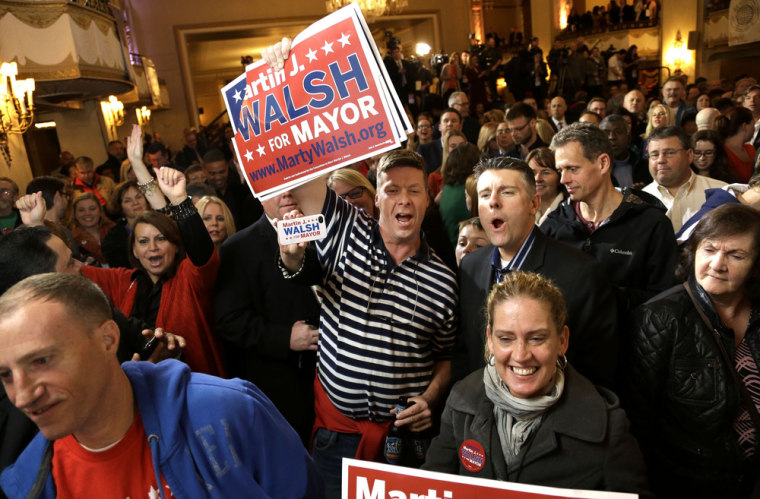Governor's races in Virginia and New Jersey highlighted Tuesday's off-year elections, but voters across the U.S. decided several other contests that could have national implications.
For the first time in 20 years, Boston's mayor won't be Tom Menino, who chose not to run for a sixth term. State Rep. Marty Walsh, 46, edged City Council member John Connolly, 40, a fellow Democrat, after endorsements from numerous labor and minority activist groups helped him surge from almost 10 points down in the last month. Walsh took 52 percent of the vote.
In other races:
Mayors
Detroit: Mike Duggan, 54, the former head of the Detroit Medical Center, defeated Wayne County Sheriff Benny Napoleon, 58, with 55 percent of the vote to become Detroit's first white mayor in four decades. He won't have much authority: Detroit has declared bankruptcy and is run by a state-appointed emergency manager.
New York: Democratic Public Advocate Bill de Blasio, 52, soundly defeated Republican Joe Lhota, 59, who resigned as head of the Metropolitan Transit Authority to run for mayor. De Blasio, who will be the city's first Democratic mayor since 1993, emerged from a crowded Democratic primary field after City Council President Christine Quinn and former U.S. Rep. Anthony Weiner fell by the wayside. He trounced Lhota by a margin of roughly 49 percentage points.
Other elections
Virginia: The state attorney general's race was set for a recount early Wednesday as Republican state Sen. Mark Obenshain, 51, was locked in a virtual dead heat with Democratic state Sen. Mark Herring, 52. The two fought a tight contest, with Democrats and outside groups pouring money into the race in an attempt to tie Obenshain to the floundering gubernatorial campaign of Republican Tea Party favorite Ken Cuccinelli. Obenshain and Herring were deadlocked at 50 percent each of more than 2.1 million cast Tuesday.
Alabama: The Republican runoff for a Dec. 7 special election in the 1st Congressional District was a proxy battle for the turmoil in the national party. Former state Sen. Bradley Byrne, 58, who defected from the Democratic Party in 1997 and had the backing of establishment Republicans and business groups, beat Dean Young, 49 — a Tea Party conservative who falsely said in an interview last week that President Barack Obama was born in Kenya — with 52 percent.
Ballot initiatives
Colorado: Voters passed a 25 percent tax on recreational marijuana beginning Jan. 1, when retailers being selling pot legally in the state, which was one of the first two (with Washington) to legalize it. Almost two-thirds of voters backed the measure.
11 rural counties in the northeastern corner of the state served a divided vote on a ballot initiative to start the process of seceding from Colorado to try to form a 51st state: North Colorado. Six counties voted against the idea, while five counties backed it. The secessionist movement was widely seen as more of a general protest than a viable option, because secession would also have to be approved at the state level and then by Congress.
New York: Voters approved a constitutional amendment that makes New York the largest state to allow Vegas-style casinos on non-Indian lands. Seven gaming palaces will be built around the state, including eventually in New York City.
Texas: Harris County voters defeated a referendum measure to turn the "Eighth Wonder of the World" — the now-crumbling Houston Astrodome — into a convention center, according to The Associated Press. The nation's first domed stadium, which gave its name to AstroTurf, will likely be razed.
Washington: Major national grocery chains went all out to defeat a statewide initiative that would make Washington the first state to require labels for foods containing genetically modified ingredients. (Connecticut has already passed such a law, but it wouldn't go into effect until other states pass similar measures.) The measure was trailing with 47 percent support in the first released results Tuesday night after opponents outspent backers by almost 3-to-1, arguing that the requirement would send food prices through the roof.
And in the city of SeaTac, south of Seattle, residents were backing a measure to raise the minimum wage to $15 an hour — more than twice that national level — for many workers in and around Seattle-Tacoma International Airport. In early returns, the higher wage had 54 percent support.
Daniel Arkin of NBC News contributed to this report.
Related:
